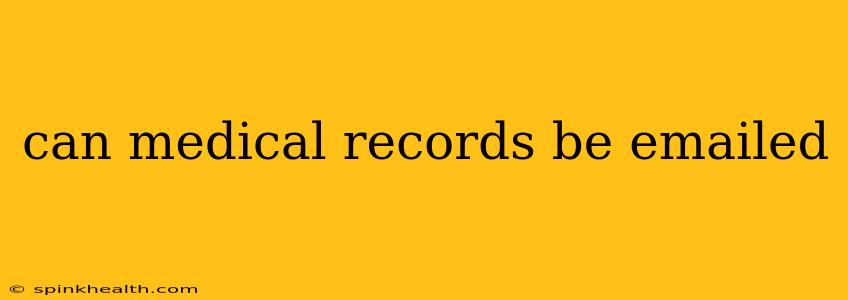Can Medical Records Be Emailed? Navigating the HIPAA Maze of Digital Health Information
The short answer is: generally, no, medical records shouldn't be emailed. While the convenience of a quick email seems appealing, emailing protected health information (PHI) like medical records carries significant risks, primarily violating the Health Insurance Portability and Accountability Act of 1996 (HIPAA). Let's unravel the complexities and explore the safer alternatives.
My name is Dr. Anya Sharma, and I've spent years working in healthcare administration and compliance, witnessing firsthand the challenges and importance of secure medical record handling. This post aims to clarify the issues surrounding emailing medical records and offer practical solutions.
Why Emailing Medical Records is Risky
Email, in its basic form, isn't secure enough to transmit PHI. Think of it like sending a postcard with your most sensitive details – anyone could potentially intercept and read it. Here's why emailing medical records is a problem:
-
HIPAA Violations: HIPAA regulations are strict about protecting patient privacy. Sending PHI via unsecured email is a direct violation, potentially leading to hefty fines and legal repercussions for healthcare providers.
-
Data Breaches: Email is vulnerable to hacking and phishing attacks. A simple breach could expose sensitive patient information to unauthorized individuals, leading to identity theft, medical fraud, and significant emotional distress for patients.
-
Lack of Confidentiality: Emails can be easily forwarded, copied, or intercepted, compromising the confidentiality of the information. Even if sent to the intended recipient, there's no guarantee of its security on their end.
-
Data Integrity: Email attachments can be easily altered or corrupted during transmission, raising concerns about the accuracy of the medical information.
What are the Alternatives to Emailing Medical Records?
Fortunately, there are HIPAA-compliant methods for accessing and sharing medical information:
-
Patient Portals: Many healthcare providers now offer secure online patient portals. These portals allow patients to access their medical records, request appointments, and communicate securely with their providers.
-
Secure Messaging within Patient Portals: Instead of email, communicate with your doctor through the secure messaging feature provided by the patient portal.
-
Faxing: While not ideal, faxing remains a relatively secure method for transmitting medical records, particularly if your provider doesn't have a secure patient portal. However, it's worth noting that even faxes can be vulnerable if not handled carefully.
-
Secure File Transfer Protocol (SFTP): This is a robust method, particularly for larger healthcare systems, that uses secure connections to transfer files.
-
Direct Secure Messaging: This is a newer standard for sending secure messages between healthcare providers.
Can a Doctor Email Me My Medical Records?
As explained above, a doctor should not email your medical records directly. If they need to send you specific information, it should be done through a secure patient portal or other HIPAA-compliant method.
How Can I Access My Medical Records Electronically?
Most healthcare providers are moving towards electronic health records (EHRs), which makes accessing your information easier. Look for online patient portals offered by your doctor's office or hospital. If you're having trouble accessing your records electronically, contact your provider's office and inquire about their methods for secure information sharing.
What Happens if a Doctor Emails My Medical Records?
If a doctor emails your medical records, it is a HIPAA violation. While the consequences depend on various factors, it could lead to investigations, fines, and potential legal action against the provider. It's important to remember that patient privacy is paramount, and the secure handling of medical information is a vital aspect of ethical medical practice.
In conclusion, while the simplicity of email is tempting, it's crucial to prioritize patient privacy and security. Always use HIPAA-compliant methods when exchanging medical records. If you have questions about accessing your medical records, contact your healthcare provider to explore the secure options available. Your health information is valuable, and protecting it is a shared responsibility.

